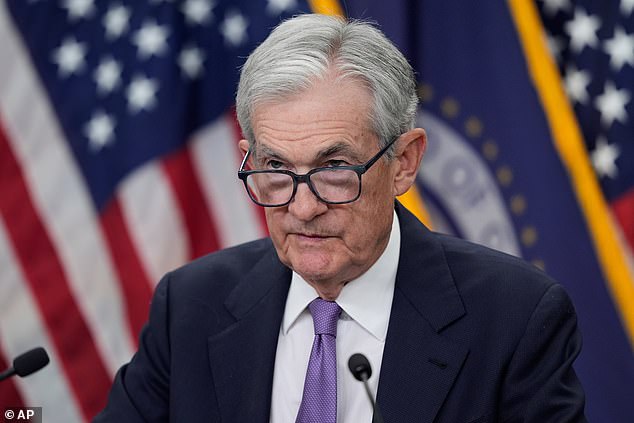Normally, investors can look towards a market rally at the year’s end. But as we head towards the holiday season, the uncertainties are mounting.
Here in the UK, next week’s Budget hangs like the sword of Damocles over the economy and business.
In the past several weeks, there has been a never-ending stream of negativism from every sector of UK enterprise.
Big corporates – notably retail – lament plummeting consumer confidence. And smaller family firms are recoiling from an end to ‘business property relief’ against inheritance taxes.
Nobody ever welcomes an income tax rise at a time when so many working Britons have been thrust into a higher tax band by the freeze on allowances.
Even so, company bosses I’ve chatted to in recent days are of the view that an income tax rise, now abandoned, would have been preferable to the promised smorgasbord of lesser tax increases.

Uncertainty: US Federal Reserve chair Jerome Powell (pictured) has cautioned that an end-of-year interest rate reduction is not a ‘foregone conclusion’
As we know from last year’s Budget, Labour politicians seem incapable of understanding the damaging consequences of their actions on commerce.
Britain lives in its own economic micro-climate driven by last October’s 70 tax and spending changes followed by another 33 changes in the Spring.
There is another raft to come in a week’s time. This is as far from stability as one can get.
The Chancellor Rachel Reeves is adamant that her £120billion of extra capital spending over the length of the Parliament will be transforming when we see new airport runways and nuclear plants.
Maybe, but in the same way as the Chancellor misreads the impact of her tax rises on business, she doesn’t have any conception of the capacity constraints holding back infrastructure and affordable housing.
The UK’s budgetary marathon coincides with the first signs that equity market confidence is crumbling.
The wealth of investors in shares is not immediately threatened with the FTSE 100 up 15 per cent or so this year.
The American S&P 500 has climbed 13 per cent on the year to date and 35 per cent since its April trough after the Trump tariff mayhem. The tech-heavy Nasdaq has soared 50 per cent. Many individuals and institutions are sitting on big profits.
But the air is escaping from the balloon. Until now, caution about excessive optimism has been muted.
The dependence of markets on the concentrated risk in the Silicon Valley giants dismissed.
The froth in speculative assets, such as bitcoin, regarded as a sideshow. It has been an act of faith that AI offers capitalism deliverance from productivity constraints.
Yet since Oracle unveiled its $300billion deal with OpenAI in September, the first of many such transactions, the company’s market valuation has shed $374billion. That’s not much of a vote of confidence.
One becomes ever more nervy when Sundar Pichai, chief executive of Google owner Alphabet, takes to the airwaves ominously to pronounce that no one will be unscathed should the artificial intelligence boom collapse.
It is no accident that Softbank’s Masayoshi Son, shrewdest of tech investors, recently disposed of his fund’s $5.8billion stake in AI chip pioneer Nvidia. Tech billionaire Peter Thiel sold his entire Nvidia stake in the third quarter.
None of this alone portends an impending market crash. Experience suggests that it is not market activity, in and of itself, which sparks stock corrections and meltdowns but macro events.
Tariff mayhem precipitated the April sell-off. Going back in time it was an obscure dispute between US central bank the Federal Reserve and the Bundesbank in Germany which triggered the 1987 Wall Street meltdown.
The impact of central bank policy on markets should never be under-estimated. Until the last few days a cut in America’s key federal funds rate from its current 3.75 per cent to 4 per cent range in December was nailed on.
Fed chair Jerome Powell has cautioned that an end-of-year reduction is not a ‘foregone conclusion’.
In so doing he shattered market consensus and buoyancy. Another stupendous Nvidia set of results today could potentially change the alchemy.
But if the Fed keeps its foot on the interest rate brakes, amid renewed inflationary concerns, it will be time for investors to check out the escape routes.
DIY INVESTING PLATFORMS

AJ Bell

AJ Bell
Easy investing and ready-made portfolios

Hargreaves Lansdown

Hargreaves Lansdown
Free fund dealing and investment ideas

interactive investor

interactive investor
Flat-fee investing from £4.99 per month

Freetrade

Freetrade
Investing Isa now free on basic plan

Trading 212

Trading 212
Free share dealing and no account fee
Affiliate links: If you take out a product This is Money may earn a commission. These deals are chosen by our editorial team, as we think they are worth highlighting. This does not affect our editorial independence.

